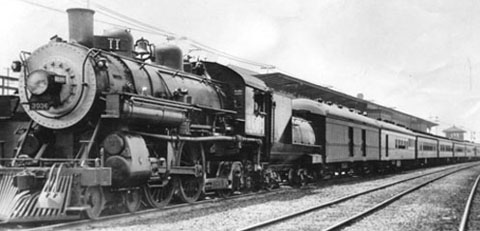

|
Reflections on Black History ______ Part 51 |
Job Status on the Railroad
by Thomas C. Fleming, Sep 9, 1998 In 1927, when I was hired by the Southern Pacific as fourth cook on a dining car, I soon learned the status of the many jobs on the railroad. The steward, a white man, saw that company policy was religiously followed by the cooks and waiters. When a diner had paid for his meal, the waiter would turn over the receipt and money to the steward, with the exception of the tip. Next in authority was the pantryman, who was always black. He was a sort of headwaiter, whose duty was to keep the pantry clean, to see that the silverware and plates were well stocked, and to keep a list of what was needed in the pantry. The chef was boss of the kitchen. He track of all of the kitchen needs and handled the charcoal broiler, on which he cooked steaks, poultry and fish. The second cook made the soups, cooked the roasts in the oven and handed out the orders to the waiters. The third cook was fry cook, and worked hard. Everything that went on the range, he cooked it. The fourth cook had to peel spuds, shell peas, prepare fresh vegetables and wash the dishes. On the morning of my first trip, I changed to the pants and jacket that the company supplied, and put on the apron and cook's cap. While waiting for the train to get its load of human beings, the chef started me to shelling a 50-pound sack of green peas.
Train 101 of the Sunset Limited, which the Southern Pacific operated between San Francisco, Los Angeles and New Orleans. This train was used from 1927 to 1930, when Thomas Fleming worked for the company as a dining car cook. The photo was taken somewhere between San Francisco and San Jose. (Courtesy of Guy Dunscomb.)
Departure time came. The conductor took out his watch, gave a final look and called, "Board!" The locomotive let out a blast of steam released by the engineer, the brakes were eased, and the engine shuddered into motion. The wheels of the great train rolled jerkily, then smoothed out, as it moved slowly out of the ferry terminal. I felt a thrill as the train really began to roll, and a waiter came into the pantry and shouted his first order through the window. The dining car crew was kept busy, as more and more passengers came into the diner to eat breakfast. All of the time I was washing dishes and doing everything the other cooks would ask, while looking out of the window whenever I got a chance. When I finished the peas, I was ordered to peel a lot of potatoes for lunch and put them in a large pot filled with water. About 10:30 a.m., breakfast was over and the waiters asked for their meals, which we had to prepare. Most of them wanted an omelette of some kind, which made the chef mad. I found myself forming a dislike for them also, because they thought the fourth cook was just a dishwasher without any status at all. All this time, the mail clerks were at work sorting mail in the mail cars, which were a standard part of passenger trains. They were employees of the U.S. Postal Service, and earned slightly higher pay than the clerks on land. At every stop, there was a mail truck waiting to bring mail to the train and receive the mail destined for that town. A lot of people wanted that job because there was no supervisor; they were working alone, or with just one other person. Others liked it because they were out for so many days, and when they got back, they had some time off. Some of the mail clerks were black. Blacks worked for the post office as clerks and carriers all over the country, including the Deep South. Some Pullman porters were becoming homeowners, as were those blacks who were fortunate enough to hold civil service jobs, in whatever positions the federal government had permitted a few token blacks to slip or slide into. Mexicans weren't hired to ride the trains, but they worked as section hands, in gangs of probably six or seven men, with a foreman who was also Mexican. I think each section gang had a route which they had to go over every day, of a certain number of miles of track. When they reached the limit, another gang took over. Some of them had hand cars, with handles they would pump up and down to move forward. The Southern Pacific gave them a place to sleep. The company would take old boxcars, convert them into two-room cabins, then remove the wheels and lay them alongside the tracks. They had a lot of kids, who attended the public schools, but the ones I got to know during my childhood were kind of meek, and took a lot of abuse from the other kids. There would probably be four or five families living together, in several boxcars. You found them right outside of all towns in California; that was part of the landscape. They might have been the only ones who wanted to do the job, because they got the lowest pay of any railroad workers -- about $40 a month.
Copyright © 1998 by Thomas Fleming. Email. At 90, Fleming continues to write each week for the Sun-Reporter, San Francisco's African American weekly, which he co-founded in 1944. A 48-page book of his stories and photos from 1907-19 is available for $3, including postage, and a 90-minute cassette tape of his recollections of black life in Florida, Harlem and Chico from 1912-1926 is available for $5, including postage. Send mailing address or call 415-771-6279.
Fleming Biography More Fleming articles Back to Front Page |